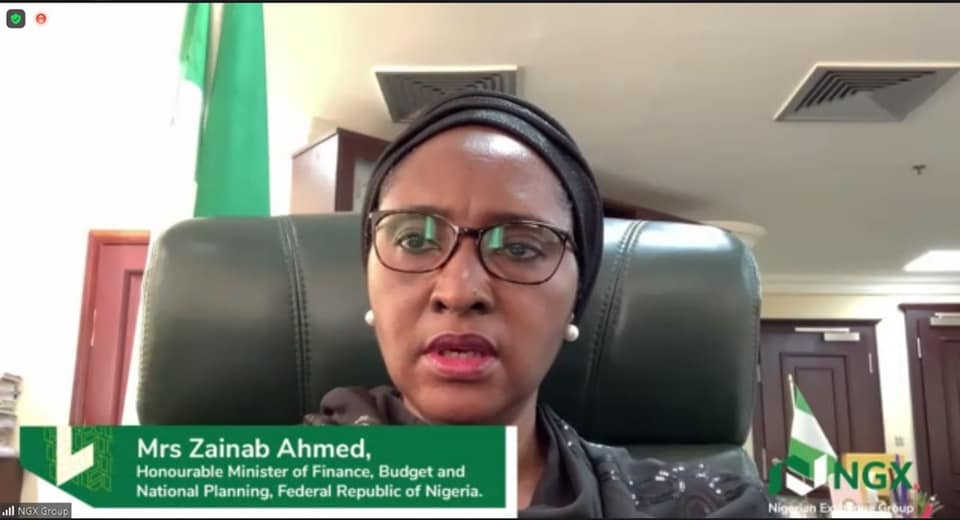Economy
Nigerian Economy on Solid Path to Recovery with 5.01% Growth—FG

By Modupe Gbadeyanka
The federal government has expressed satisfaction with the 5.01 per cent growth in the gross domestic product (GDP) for the second quarter of 2021.
The Minister of Finance, Budget and National Planning, Mrs Zainab Ahmed, said this shows that the Nigerian economy was on the solid path to recovery.
Mrs Ahmed, while speaking at an Executive Intelligence Management Course 14 of the National Institute for Security Studies (NISS), Bwari, Abuja, said the administration of Mr Muhammadu Buhari has shown a strong commitment to sustainable development, governance and security despite the nation’s limited revenues.
At the event themed Governance, Security and Sustainable Development in Africa: Nexus, Challenges and Prospects, the Minister said, “The most recent GDP data which reports real growth of 5.01 per cent in the second quarter of 2021 is very encouraging news as it indicates the Nigerian economy is on a solid path to recovery.
“It is important to note that much of the growth was driven by the expansion of the non-oil sector of the economy where most Nigerians are employed.”
She further said due to its importance to every sector, especially the economy, the central government has made funds available to security.
“As an example, about 86 per cent of the 2021 Supplementary Budget was dedicated to the capital and recurrent expenditure needs of the security agencies to supplement the allocations in the 2021 amended budget,” she said.
While speaking on some key governance and security initiatives spearheaded by the Ministry and its agencies, Mrs Ahmed said that through Project Lighthouse, the federal government has been able to aggregate N5.2 trillion worth of debts owed to the government by third parties, of which N49.7 billion of this amount has been recovered.
She also said another initiative is the Treasury Single Account (TSA), a unified structure of government bank accounts that enables consolidation and optimum utilisation of government cash resources.
In addition, she said her ministry came up with the Government Integrated Financial Management Information System (GIFMIS), an IT-based system for budget management and accounting to improve public financial management processes and enhance accountability and transparency across all ministries, departments and agencies (MDAs) of government.
Mrs Ahmed also said in order to modernise tax administration in Nigeria, the Federal Inland Revenue Service (FIRS) introduced TaxPro Max, while the Nigeria Customs Service (NCS) designed the e-Customs Project meant to fully automate administrative processes by introducing innovative measures that eliminate paper-based functions.
The Minister, in addition, said another policy is the Road Infrastructure Tax Credit Scheme (RITCS) launched by President Buhari through Executive Order Number 7 signed on January 25, 2019.
“It is designed to leverage private sector capital, efficiency and expertise to construct, repair and maintain critical road infrastructure in key economic corridors and industrial clusters in Nigeria. The scheme relieves the government of the burden of funding significant outlays for road projects through the annual budget.
“Essentially, the RITCS utilises tax expenditures, by way of tax credits, to finance the construction of critical road and bridge infrastructure through an innovative public-private partnership (PPP) mechanism that incentivises private sector participation. Since inception, Mr President has approved a total of 33 road projects, totalling 1,564.95 km being undertaken in 19 States across the six geo-political zones of the country,” she said.
She also highlighted the Open Government Partnership (OGP), an international multi-stakeholder initiative focused on improving transparency, accountability, citizen participation and government responsiveness to citizens through technology and innovation.
“Since joining the partnership in July 2016, Nigeria has made progress in deepening transparency, accountability and openness in the management of public resources, especially in terms of the budget process,” she said.
Mrs Ahmed further stated that the Office of the Accountant General of the Federation (OAGF) in December 2019 launched the Open Treasury Portal, a platform aimed to enhance the accountability of government by detailing and tracking federal government spending data through the publishing of monthly fiscal accounts, as well as daily treasury and payment reports amongst others by MDAs.
Economy
Moniepoint Research Shows Diminishing Role of Cash in Nightlife Payments

By Modupe Gbadeyanka
A new report released by Africa’s leading all-in-one financial ecosystem, Moniepoint Incorporated, has revealed that the use of cash for financial transactions is gradually dying due to security concerns.
The study, which looked into transaction data of over 27,000 clubs, bars, and lounges, showed that bank transfers dominated, followed closely by card payments, with cash actively discouraged. It was observed that transfers outpace card payments by nearly 2 million transactions during peak nighttime hours across its network.
In the research titled The Business of Community Nightlife in Nigeria, findings provided a rare, data-driven look into the country’s informal night economy.
While high-end Detty December venues grabbed headlines with daily revenues of N360 million and table prices reaching N1.2 million, Moniepoint’s study shifted the spotlight to the “community nightlife” where roadside bars, suya spots, and neighbourhood joints form the bedrock of social life for millions of Nigerians.
One of the study’s most operationally significant findings concerns the timing of spending. Nightlife in Nigeria runs late, but economically, the night is decided early.
Transaction volumes begin climbing sharply from 8 pm, peak before midnight, and then decline steadily even as venues remain full. By the time the night is at its longest, purchasing activity has already wound down.
However, for bar operators, this has clear practical implications – the most critical hours for staffing, stocking, vendor payment and cash flow management are the earliest hours of the day between midnight and 6 am.
The report further underscores the sector’s role in employment, noting that local bars typically expand their workforce by 30-50 per cent on peak nights. Conservative estimates suggest that at least 54,000 people are engaged in nightlife labour every night across Nigeria.
It was also observed that the most common transaction narrations from the data sourced – “food”, “pay”, “sent”, “pos”, “cash” – reflect the full breadth of nightlife spending: street food, club entry, lounge tabs, transport, and afterparties. Digital payments have gained huge traction in Nigeria’s social space.
While alcohol remains a key revenue driver, the data shows that food is the quiet stabiliser of Nigeria’s night economy, particularly in local and informal settings. In several neighbourhood venues, bottled water and meals outsell beer and spirits, especially early in the evening.
Lagos leads in sheer concentration of nightlife establishments, with 4,856 bars, clubs, and lounges on the Moniepoint network. FCT follows with 2,515, then Rivers (2,362), Delta (1,930), and Edo (1,574).
Katsina leads the country in nighttime food truck payment value, with vendors pulling in over N130 million in the last 12 months. Kwara State leads in transaction count. Nigeria’s nightlife economy is distributed, not overly elitist.
On the lending side, the report noted that a significant share of loan requests from bar and lounge operators is directed toward renovations, furniture, lighting, and sound systems, showing that investments are intended to attract and retain customers in a competitive sector where ambience plays a decisive role.
Commenting on the report, the chief executive of Moniepoint, Mr Tosin Eniolorunda, said, “Nigeria’s local bars and night-time operators are not peripheral to the economy; they are a critical part of its architecture. We see a substantial and sustained economic sector that employs hundreds of thousands of Nigerians every night and deserves the same attention we give to agriculture, healthcare, and retail.
“Our goal is to make sure every one of those businesses has the tools to grow. From giving credit to finance renovations and sound systems to providing same-day settlement that allows vendors to restock and with tools like Moniebook that power inventory management and reconciliation, Moniepoint is ensuring that this vital artery of the nation’s economy remains viable and empowering.”
Economy
CBN Reduces Interest Rate by 50 Basis Points to 26.50%

By Adedapo Adesanya
The Central Bank of Nigeria (CBN) has cut the interest rate by 50 basis points to 26.50 per cent from 27 per cent.
Nigeria’s apex bank announced this during its two-day 304th Monetary Policy Committee (MPC) meeting, which concluded on Tuesday in Abuja.
This comes after the country’s interest rate cooled in January to 15.10 per cent from 15.15 per cent, according to the National Bureau of Statistics (NBS), strengthening the case for a reduction.
The CBN Governor, Mr Yemi Cardoso, said all members of the MPC unanimously agreed upon the decision.
“The committee decided to reduce the monetary policy rate by 50 basis points to 26.50 per cent,” he said.
Mr Cardoso stated that the liquidity ratio was maintained at 30 per cent, and the standing facilities corridor was adjusted to +50 to -450 basis points around the monetary policy rate.
He said the committee retained the Cash Reserve Ratio (CRR) at 45 per cent for commercial banks and 16 per cent for merchant banks, while the 75 per cent CRR on non-TSA public sector deposits was equally maintained.
The CBN uses the MPR, which works as the benchmark interest rate, to manage inflation, macroeconomic stability, and liquidity.
Last November, the MPC retained the Monetary Policy Rate (MPR) at 27.00 per cent. The last time the apex bank cut interest rates was in September last year, to 27 per cent from 27.50 per cent after a series of easing in inflation.
Market analysts had argued for higher interest cuts due to results seen in the CBN’s inflation targeting framework. Meanwhile, some say the 50 basis points reduction will offer a temporary reprieve as inflation heads for a single-digit target in the coming months.
Economy
Grey to Cut Cross-Border Payment Costs with New USD Offering

By Adedapo Adesanya
A cross-border payments solutions company, Grey has expanded its business banking platform to include US Dollar corporate accounts, bulk international payments, and USDC stablecoin support, all integrated into a single system.
The company is positioning itself as a low-cost, faster alternative to traditional international banking, particularly for businesses in emerging markets as it enables companies to open US Dollar accounts, receive global payments, and send payouts to 170+ countries, including bulk transfers, within minutes.
Grey aims to solve common cross-border payment challenges, particularly the high transfer costs that often range between 6 and 7 per cent of transaction value, prolonged settlement cycles that can stretch across several days, and the limited access many businesses face when trying to open and operate foreign currency accounts. In addition, companies frequently contend with hidden intermediary fees and poor foreign exchange transparency, both of which undermine cost predictability and effective cash flow management.
By integrating USD business accounts and USDC stablecoin functionality into its platform, Grey enhances its value proposition around faster settlement, clearer pricing structures, improved cost efficiency, and broader global accessibility. The expanded capabilities enable businesses to manage international transactions with greater speed, transparency, and operational control.
“Businesses may operate without borders today, but access to reliable global banking remains uneven, particularly for companies in high-growth markets,” said Mr Idorenyin Obong, Co-founder and Chief Executive Officer of Grey. “We’re closing that gap and enabling businesses to move money faster, with greater transparency and control, wherever their clients or partners are based.”
“When payments are delayed, or costs are unpredictable, growth stalls,” added Mr Joseph Femi Aghedo, Chief Operating Officer and Co-founder of Grey. “Grey eliminates those friction points, giving businesses a faster, simpler way to manage payroll, supplier payments, and partner payouts across borders. Adding USD and stablecoin capabilities makes these benefits accessible to even more customers.”
Established in Africa in 2020, Grey has a presence in key markets, including the United States, the United Kingdom, and Europe, and has recently expanded its services and operations into Latin America and Southeast Asia.
Since its inception, the company has consistently enhanced its services to empower digital nomads worldwide, regardless of location. Grey’s offerings include multi-currency accounts, low-cost international money transfers, a virtual USD card, expense management tools, and robust security measures.
-

 Feature/OPED6 years ago
Feature/OPED6 years agoDavos was Different this year
-
Travel/Tourism10 years ago
Lagos Seals Western Lodge Hotel In Ikorodu
-

 Showbiz3 years ago
Showbiz3 years agoEstranged Lover Releases Videos of Empress Njamah Bathing
-

 Banking8 years ago
Banking8 years agoSort Codes of GTBank Branches in Nigeria
-

 Economy3 years ago
Economy3 years agoSubsidy Removal: CNG at N130 Per Litre Cheaper Than Petrol—IPMAN
-

 Banking3 years ago
Banking3 years agoSort Codes of UBA Branches in Nigeria
-

 Banking3 years ago
Banking3 years agoFirst Bank Announces Planned Downtime
-

 Sports3 years ago
Sports3 years agoHighest Paid Nigerian Footballer – How Much Do Nigerian Footballers Earn






















